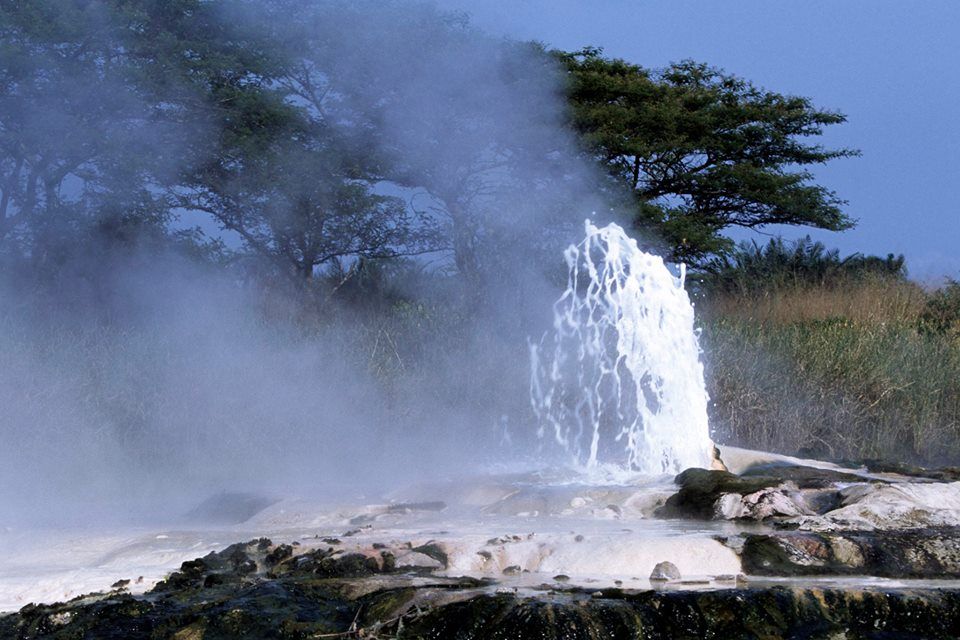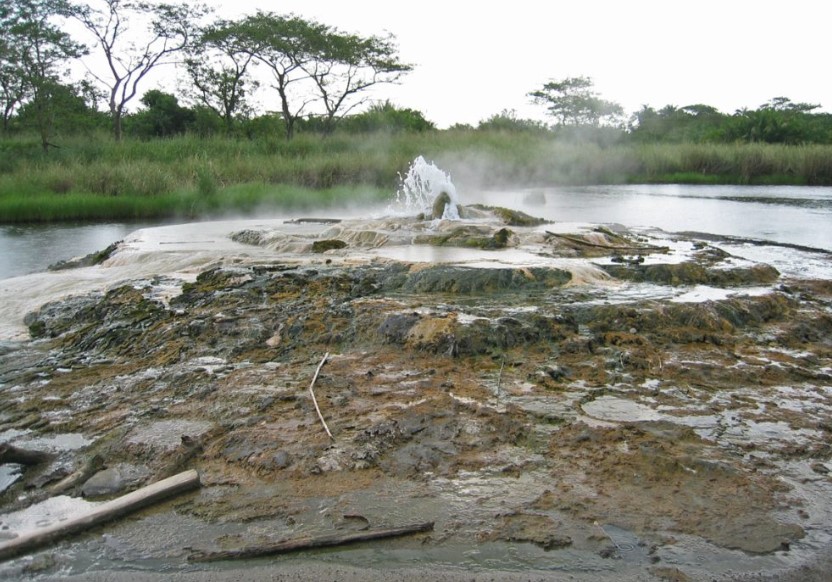Rwagimba Hot Spring – Nature’s hidden treasures often lie in the most unexpected places, and one such marvel is the Rwagimba Hot Spring. Nestled amidst the lush landscapes of Rwanda, this enchanting geothermal wonder offers a unique blend of relaxation, cultural significance, and natural beauty.
In this article, we embark on a journey to discover the mystique and allure of Rwagimba Hot Spring, delving into its history, geology, ecological significance, and the profound impact it has on the local community and beyond
Unveiling the Origins Of Rwagimba Hot Spring
Rwagimba Hot Spring, situated in the Musanze District of Rwanda, is more than just a picturesque natural phenomenon; it’s a testament to the geological processes shaping our planet. The spring emerges from the Virunga Volcanoes, a region known for its volcanic activity, and its origins can be traced back to deep within the Earth’s crust.
This hot spring is formed when groundwater seeps into the Earth’s crust, where it is heated by the molten rock below. As the water travels through these underground chambers, it becomes enriched with minerals and heat, eventually resurfacing as a soothing and rejuvenating hot spring. The temperature of Rwagimba Hot Spring can reach up to 40 degrees Celsius (104 degrees Fahrenheit), making it an ideal natural spa.
The Ecological Oasis Of Rwagimba Hot Spring
Rwagimba Hot Spring creates a unique microclimate around its vicinity, fostering a diverse ecosystem that thrives on the warmth and mineral-rich waters. The hot spring’s environs are a sanctuary for various flora and fauna, making it a hotspot for ecological research.
The lush vegetation surrounding the spring comprises rare and endemic plant species adapted to the warm and humid conditions. Birds, insects, and amphibians are abundant, and it’s not uncommon to spot colorful butterflies fluttering through the air. The hot spring also sustains a variety of fish species, which have adapted to the higher water temperatures.
Cultural Significance Of Rwagimba Hot Spring
Beyond its geological and ecological significance, Rwagimba Hot Spring holds a special place in the hearts of the local Rwandan community. It is considered a sacred site and is often visited for cultural and spiritual ceremonies. The spring is believed to have healing properties, and local residents have been using its waters for therapeutic purposes for generations.
Rwagimba Hot Spring is also an essential part of the local heritage, with stories and legends passed down through oral traditions. Its cultural importance is celebrated during various festivals and rituals, making it an integral part of the community’s identity.
A Natural Spa Retreat
For those seeking relaxation and rejuvenation, Rwagimba Hot Spring offers a unique spa experience amidst a natural setting. The warm, mineral-rich waters are known for their therapeutic benefits, particularly for their soothing effects on muscles and joints. Visitors can immerse themselves in the tranquil pools, letting the healing waters work their magic.
The surrounding scenery, characterized by lush greenery and the gentle sound of flowing water, creates a serene ambiance that enhances the overall spa experience. Many visitors come here to unwind, detoxify, and bask in the tranquility of nature.
Conservation Efforts
As the popularity of Rwagimba Hot Spring grows, so does the need for responsible conservation efforts. The delicate ecosystem surrounding the spring is vulnerable to disturbances, and it’s crucial to strike a balance between promoting tourism and preserving the natural environment.
Local conservation organizations, in collaboration with the government, have taken steps to protect this unique ecosystem. Initiatives such as visitor education, waste management, and sustainable tourism practices are being implemented to ensure that future generations can continue to enjoy the wonders of Rwagimba Hot Spring.
The Future of Rwagimba Hot Spring
Rwagimba Hot Spring’s significance extends beyond its geological, ecological, and cultural aspects. It has become a thriving tourism destination, attracting visitors from all corners of the world. This surge in popularity has the potential to drive economic growth in the region, providing opportunities for local businesses and communities.
As Rwanda continues to position itself as a sustainable and responsible tourism destination, Rwagimba Hot Spring can serve as a model for the integration of conservation, culture, and wellness tourism. Investments in infrastructure, accessibility, and visitor facilities can further enhance the experience while safeguarding the natural beauty of the site.
Conclusion
Rwagimba Hot Spring, with its origins in the depths of the Earth, offers a remarkable blend of geological wonder, ecological diversity, cultural significance, and wellness opportunities. It stands as a testament to the interconnectedness of nature and human heritage.
As we explore this hidden gem in Rwanda, we not only find relaxation and rejuvenation but also a profound appreciation for the delicate balance between the preservation of natural wonders and responsible tourism development. Rwagimba Hot Spring, with its rich tapestry of history and beauty, is a true testament to the splendors of our planet.



Comment (0)